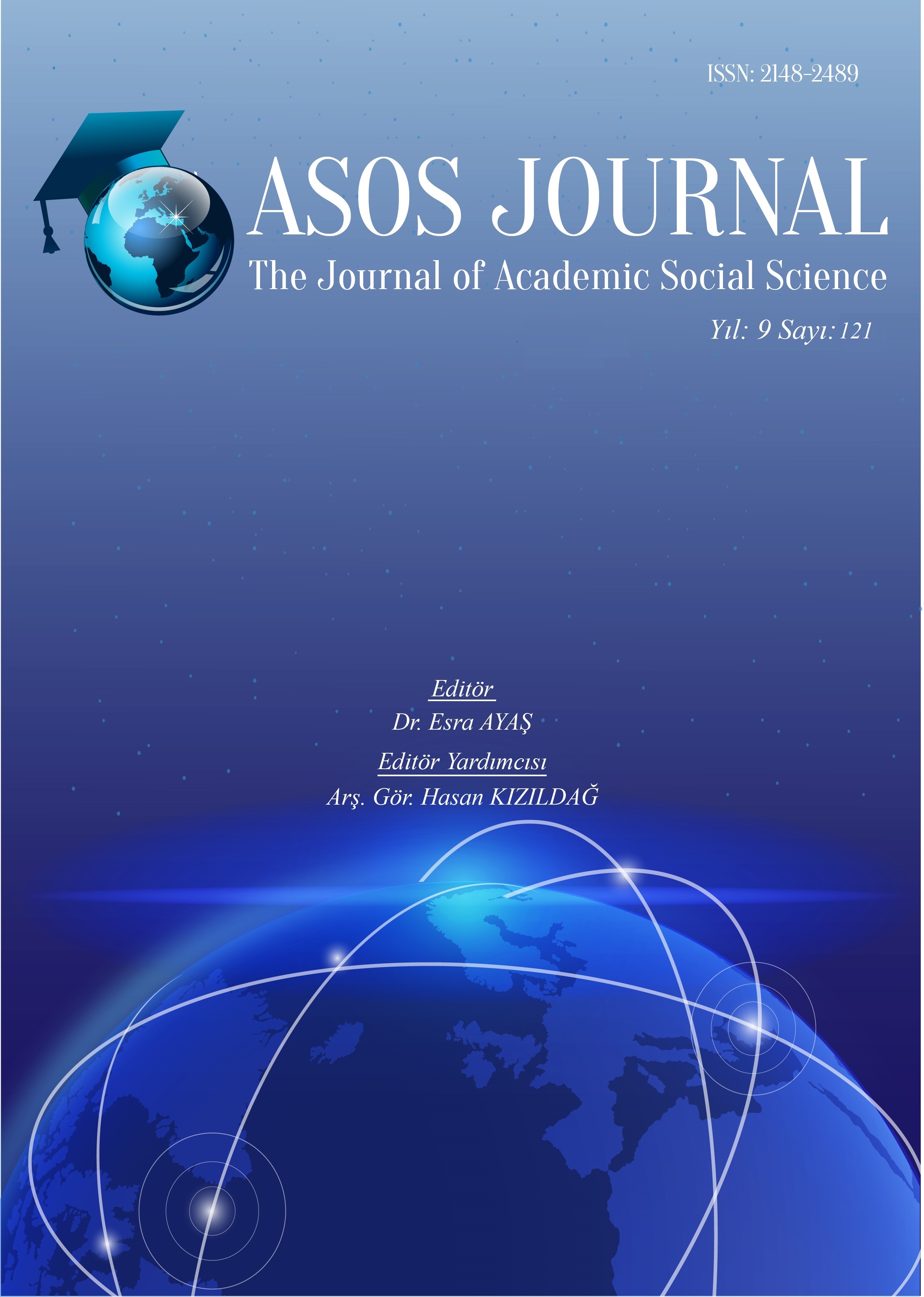Author :
Abstract
Araştırmada ortaokul öğrencilerinin müzik dersine yönelik tutumlarını farklı değişkenler açısından incelemek amaçlanmıştır. Bu amaç doğrultusunda genel, özel, yatılı bölge ve imam hatip ortaokullarının 5., 6., 7. ve 8. sınıf düzeyinde öğrenim gören öğrencilerin müzik dersine yönelik tutumlarının; öğrenim görülen okul türü, sınıf, cinsiyet, anne-baba öğrenim durumu, özel müzik dersi alma, kendine ait bir enstrümanı olma, okulda müzik dersi için farklı sınıf olması ve müzik dersi ile ilgili etkinliklere katılma değişkenlerine göre farklılık durumları değerlendirilmiştir. Araştırmada betimsel nitelikte, tarama modeli kullanılmıştır. Araştırmanın evrenini Hatay ilinde öğrenim gören ortaokul öğrencileri; örneklemini ise 2019- 2020 eğitim öğretim yılında Hatay ilinden basit rastgele örnekleme yoluyla belirlenen Kumlu Aktaş ve Altınözü Altınkaya Ortaokulu, Arsuz Yükseliş ve Defne TED Koleji, Hassa Ardıçlı İstanbul Menkul Kıymetler Borsası ve Reyhan Yatılı Bölge Ortaokulu, Kırıkhan Beyzid-i Bestami ve Antakya Şehit Mehmet Şenol Çiftçi İmam Hatip Ortaokulunun 5., 6., 7. ve 8. sınıflarında öğrenim görmekte olan 725 öğrenci oluşturmaktadır. Araştırma ile ilgili veriler Özmenteş (2006) tarafından geliştirilen, “Müzik Dersine Yönelik Tutum Ölçeği” kullanılarak toplanmıştır. Araştırma bulguları doğrultusunda, öğrencilerin müzik dersine yönelik tutumlarının öğrenim görülen okul türü, öğrenim görülen sınıf, cinsiyet, anne-baba öğrenim durumu, kendilerine ait enstrümanı olma, okulda müzik dersi için farklı müzik sınıfı olması ve müzik dersi ile ilgili etkinliklere katılma değişkenlerine göre anlamlı farklılıklar gösterdiği, özel müzik dersi alma değişkenine göre ise anlamlı bir farklılığın bulunmadığı sonuçlarına ulaşılmıştır.
Keywords
Abstract
In the research, it was aimed to examine the attitudes of middle school students towards music lessons in terms of different variables. For this purpose, the attitudes of the students who are educated at the 5th, 6th, 7th and 8th grade levels of general, private, boarding and imam hatip secondary schools towards the music course; different situations were evaluated according to the type of school, class, gender, parental education status, taking a private music lesson, having an instrument of its own, having different classes for music lessons in school and participating in activities related to music lessons. In the research, a screening model of a descriptive nature was used. Middle school students studying in Hatay province in the universe of research; Kumlu Aktaş and Altinözü Altinkaya Secondary School, Arsuz Ascension and Defne TED College, Hassa Juniper Istanbul Stock Exchange and Reyhan Boarding District Secondary School, Kırhan Beyzid-i Bestami and Antakya Martyr Mehmet Şenol Farmer Imam Hatip Middle School, whose sample was determined by simple random sampling from Hatay province in the 2019-2020 academic year, 5th, 6th, 7th and 8th grades. The data related to the research were collected using the "Attitude Scale for Music Lesson" developed by Özmenteş (2006). In line with the research findings, it was concluded that the attitudes of the students towards the music course differed significantly according to the type of school studied, the class studied, the gender, the parental learning status, having their own instrument, having different music classes for music lessons in the school and participating in activities related to the music lesson, and that there was no significant difference according to the variable of taking a private music lesson.
Keywords
- Başaran, E. (1985). Eğitim psikolojisi. Ankara: Sevinç Matbaası.
- Bayram Koç, C. (2019). Lise 9. Sınıf Öğrencilerinin Müzik Dersine Yönelik Tutumlarının İncelenmesi (Giresun İli Örneği). Yayınlanmamış yüksek lisans tezi, Niğde Üniversitesi Eğitim Bilimleri Enstitüsü.
- Dilci, T. (2011). Öğretim İlke ve Yöntemleri. İstanbul: İdeal Kültür Yayıncılık.
- Güler, T. (2013). Müzik Dersi 4. Ve 5. Sınıf Öğretmen Klavuz Kitabındaki Şarkıların Öğretim Programı Kazanımlarını Gerçekleştirmedeki İşlevselliğinin İncelenmesi. Yayınlanmamış yüksek lisans tezi, Trabzon Üniversitesi Lisansüstü Eğitim Enstitüsü.
- İnceoğlu, M. (2010). Tutum algı iletişim. İstanbul: Beykent Üniversitesi Yayınları.
- Johnson, B., Christensen, L. (2014). Eğitim Araştırmaları Nicel, Nitel ve Karma Yaklaşımlar. (Çev. Selçuk Beşir Demir). Ankara: Eğiten Kitap.
- Milli Eğitim Bakanlığı. (2007). İlköğretim Müzik Dersi Öğretim Programı. Ankara: Milli Eğitim Bakanlığı Yayınları.
- Özmenteş, G. (2006). Müzik Dersine Yönelik Tutum Ölçeğinin Geliştirilmesi. İlköğretim Online, 5(1), 23- 29. Erişim adresi: http://ilkogretimonline.org.tr/index.php/io/article/view/2000/1836
- Say, A. (2011). Müzik Öğretimi. Ankara: Müzik Ansiklopedisi Yayınları.
- Say, A. (2012). Müzik Sözlüğü. Ankara: Müzik Ansiklopedisi Yayınları.
- Uçan, A. (2005). Müzik Eğitimi Temel Kavramlar-İlkeler-Yaklaşımlar ve Türkiye’deki Durum. Ankara: Evrensel Yayınevi.
- Ünal, B. (2019). Mesleki Müzik Eğitimi Alan Öğrencilerin Piyano Dersine Yönelik Öz Yeterliklerinin İncelenmesi. Yayınlanmamış yüksek lisans tezi, Niğde Ömer Halisdemir Üniversitesi Eğitim Bilimleri Enstitüsü.





